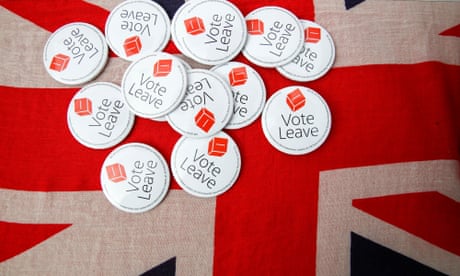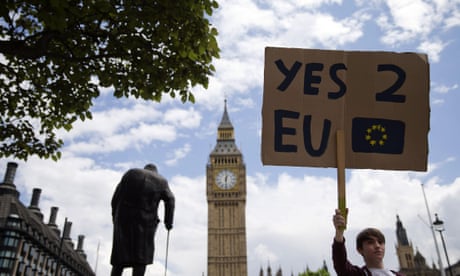Is Brexit the will of the people? And if so, which people exactly? There are many disquieting questions to be asked about world events right now. But, in the week in which Theresa May received parliament’s approval to trigger article 50 and send us crashing out of the European Union, there are none more compelling and urgent than about the integrity of our entire democratic system.
The questions that remain unanswered are not about party infighting, and not even about Brexit. The issue is this: did foreign individuals or powers, acting covertly, subvert our democracy?
There are mounting and deeply disquieting questions about the role “dark money” may have played during last year’s EU referendum; and about whether the use of offshore jurisdictions, loopholes in European and North American data laws, undeclared foreign donors, a closed, all-powerful technological system (Facebook) and an antiquated and hopelessly out-of-touch oversight body has undermined the very foundations of our electoral system.
This is what we know: the Electoral Commission is still assessing claims that potentially illegal donations were made; the information commissioner is investigating “possible illegal” use of data; the heads of MI6 and GCHQ have both voiced unprecedented warnings about foreign interference in our democratic systems; the government has refused to elaborate on what these are; one of the leave campaigns has admitted the undeclared support and help of the American hedge fund billionaire who backed Trump; the Crown Prosecution Service is being asked to mount a criminal investigation; and questions have been raised about possible unlawful collaboration between different elements of the leave campaign.
And this all leads to the next question: are we really going to allow article 50 to be triggered when we don’t even know if the referendum was freely, fairly and legally conducted?
Even if you back Brexit, even if you can’t wait for Theresa May to pull the article 50 trigger, this should be the cause of serious concern. Yes, maybe this vote went the way you wanted. But what about the next?
MI6 and GCHQ have both voiced warnings about foreign interference in our democratic systems
This weekend brought two startling warnings from two entirely different quarters. The first from the man who invented the world wide web, Tim Berners-Lee, who said he was “extremely worried” about the future of democracy; that data harvesting was being used to “chilling” effect; that political targeting on the basis of it was “unethical”; and that the internet had been weaponised and was being used against us.
The second came from GCHQ, whose National Cyber Security Centre head has written to the main political parties warning of hostile interference. This was months after the head of the MI6, Alex Younger, made an unprecedented speech warning of “cyber attacks, propaganda or subversion of the democratic process”. And he added: “The risks at stake are profound and represent a fundamental threat to our sovereignty. They should be a concern to all those who share democratic values.”
Three months on, May’s government has refused to tell us what those risks are. What does Younger know? Why has parliament not been told? Who is investigating, and when will we know the results? Where is Dominic Grieve, the head of the intelligence select committee, in all this? And how can any of us have any trust in the democratic process when vital information is being kept from us?

Watchdog to launch inquiry into misuse of data in politics
We do know that Russian interests interfered in the US election. That has been catalogued by the National Security Agency, the CIA and the FBI. And that the beneficiary of that interference was Donald Trump. We know that Trump, his campaign strategist Steve Bannon, and the billionaire who funded his campaign, Robert Mercer, all have long-standing, close ties to Nigel Farage, Arron Banks and last year’s Leave.eu campaign. We know that the data company Cambridge Analytica, owned by Mercer and with Steve Bannon on the board, undertook work for Leave.eu.
We know that Cambridge Analytica’s parent company, SCL, employed a Canadian individual – Zackary Massingham – to undertake work for it. We know Massingham is a director of a company called AggregateIQ, and that Vote Leave – the official leave campaign – paid AggregateIQ £3.5m to do its profiling and Facebook advertising. We know it paid AggregateIQ a further £725,000 on behalf of two other organisations – one of which was a 23-year-old student who worked in Vote Leave’s office. And we know Northern Ireland’s Democraticlse we know: that the law demands that coordinated campaigns declare their expenditure and are subject to a strict combined limit. Yet here we see four different campaigns using the same tiny Canadian company based thousands of miles and seven time zones away. Coincidence? And this same company, AggregateIQ, has direct links (through Massingham) to the company used by the separate campaign Leave.eu.
However, we don’t know what contact, if any, there was between these five campaigns, or if employing a North American company (in a jurisdiction known for its far less stringent laws on both data protection and financial disclosure) had other benefits. But we do know that data is power: Facebook admitted last week that it can use data to swing elections – for the right price.
All the individuals and organisations deny any wrongdoing. But there are too many questions. There may be straightforward explanations but they have to be asked, addressed and answered.
If May triggers article 50 before we have those answers, we won’t know if Brexit is the will of the people or if it’s the result of a determined foreign actor, or actors, undermining our entire democratic system.


 © Reuters
© Reuters  © PA 10 highest votes for LeaveBut reports in German newspaper
© PA 10 highest votes for LeaveBut reports in German newspaper